NewsHour’s Jeffrey Brown speaks with The New Yorker’s John Lee Andersonabout how the militant threat to Somalia’s fragile government impactscounter-terror efforts. Anderson refers to Somalia as “the world’sultimate failed state” after almost two decades of neglect from theoutside world. He says that militant groups in Somalia aspire to belike Al-Qaida and foresees the crumbling nation becoming ahaven for terrorist organizations.
Africa Archive
Free Newsletter

For regular watchers of “The Dadis Show” — the television broadcasts made by Guinea’s self-promoting junta leader, Capt. Moussa Dadis Camara, since taking power in a bloodless coup in December 2008 — the events of the last month have built into a cliffhanger. But whether it will mark the series’ season finale, or its last bow, remains to be seen. Dadis is currently convalescing at a hospital in Morocco after being shot in the head at close range on Dec. 3. His close confidante and head of the presidential guard, Lt. Abubakar “Toumba” Diakite, admitted in an interview on Dec. […]
In its first ruling since being established by the African Union in 2006, the Tanzania-based African Court of Human and Peoples’ Rights last week declared itself incompetent to ruleon a petition regarding the planned trial of former Chadian President Hissene Habré for crimes against humanity. Chadian national Micholet Yogogombaye brought the suit in an effort to halt a planned trial in Senegal, where Habré has lived since losing power in 1990. Yogogombaye instead endorsed the idea of a South African-style truth commission to deal with charges related to the tens of thousands tortured and killed during Habré’s reign. The court […]
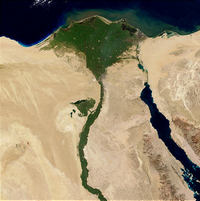
In a region that already has enough conflicts, another one is brewing, and it comes from a surprising source: the Nile. The river that has traversed history from the pharaohs through to the Bible and on to the nationalist revolution of 1952 seems poised to enter a new phase. Only this time, there may not be enough water to go around. Egypt’s history is intimately tied to the Nile. A country with very little rainfall, its agriculture was long reliant on the river’s annual floods. Public works projects through the late 19th and early 20th centuries subsequently helped regulate the […]
International and local human rights organizations have applauded Libya in recent days for some tentative steps towards greater recognition of human rights, but are calling on authorities to increase the pace of reform. Human Rights Watch released a report, “Libya: Truth and Justice Can’t Wait,” on Dec. 12, which noted that availability of the Internet and two new newspapers have increased journalists’ ability to report on some previously sensitive subjects. Nevertheless, criminal penalties brought against members of the press continue to stifle most press freedoms. HRW applauded Justice Ministry efforts to secure the release of unjustly detained Libyans and to […]
Gen. Sekouba Konate, the Guinean military’s No. 2, spoke to soldiers during avisit to one of the capital’s military barracks among swirlingspeculation that the ruling junta is splintering. Hisappearance was the first time he had spoken to the public since theassassination attempt of military leader Capt. Moussa “Dadis” Camara.
The junta in Guinea has accused French intelligence agents of orchestrating the assassination attempt on strongman Capt. Moussa Camara that led to Camara seeking urgent surgical intervention in Morocco. France has “energetically denied” the rumors, which is not surprising, but not necessarily very convincing, either. In the meantime, the French ambassador was subjected to a “muscular” search by Guinean armed forces on his way to the airport, with his bodyguards forced aside under threat of RPGs. France has vehemently protested the incident, which is not surprising, but pretty convincing. In particular, I’d be very surprised if the French troops stationed […]
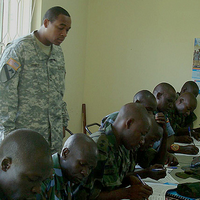
A fanatical rebel group formed in northern Uganda in the 1980s has spread to become what one U.S. general labeled a “transnational” threat, prompting the U.S. and various East African nations to work together to defeat the group. The international cooperation is the fruit of years of delicate planning by U.S. officials. The Lord’s Resistance Army, founded by Ugandan Joseph Kuny in 1986, aims to establish a Christian theocratic government in East Africa. But the group’s brutal methods — torture, abduction and rape — belie its religious roots. From Uganda, the LRA spread into neighboring Sudan, Democratic Republic of Congo […]
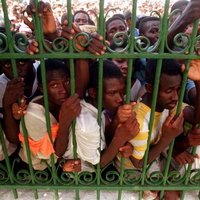
“We must make sure that the deployment of our troops is not merely the appetizer and that the main course becomes . . . an outbreak of nation-building and infrastructure construction and resources which are . . . not within our capacity to provide for everyone around the world.” After eight years of operations in Afghanistan, and the recent announcement that additional troop deployments will continue to execute a strategy that stretches the military beyond its traditional combat role for at least another 18 months, the above quotation could easily convey the commitment-fatigue prevalent in Washington these days. But the […]
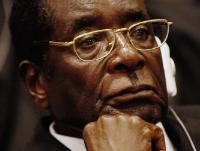
JOHANNESBURG — President Jacob Zuma’s recent appointment of a team of envoys to monitor the unity government in neighboring Zimbabwe could mark a departure from the quiet diplomacy employed by South Africa under former President Thabo Mbeki. Zuma took over the mediation role in the Zimbabwean crisis last month, and appointed a three-person team two weeks ago to oversee the functioning of Zimbabwe’s national unity government. Established on Feb. 15, the coalition government in Harare has been threatened by sharp differences between the country’s two main political rivals, President Robert Mugabe’s ZANU (PF) party and Prime Minister Morgan Tsvangirai’s principal […]
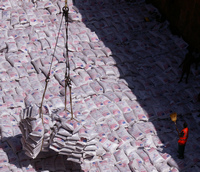
In a surprising move with huge implications for one of the world’s gravest humanitarian crises, last week the Somali Islamic group Al-Shabab told the U.N. World Food Program to stop sending foreign food aid to southern Somalia. According to a report from Voice of America, a U.S. government-funded TV news network, Al-Shabab claimed that the “massive importing of food is ruining Somalia’s agriculture sector.” The Islamists reportedly ordered the U.N. to begin buying food directly from local producers, for onward distribution to the country’s needy. The announcement is surprising and potentially worrisome, for several reasons. The move clearly reflects the […]
